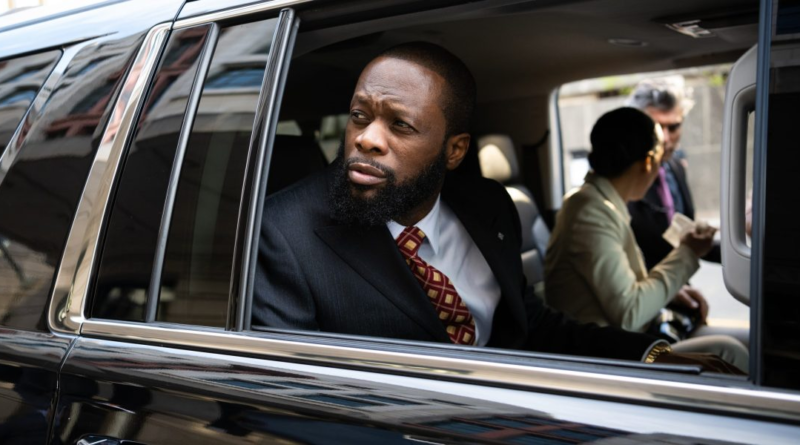Fugees rapper Michal earned $100 million as a lobbyist for an accused embezzler and then lied about it, U.S. says
Pras Michel, a Grammy-winner rapper who reinvented himself as political influencer, was paid $100 million to try to end US probes of Malaysian tycoon Jho Low and to aid the Chinese government in seeking the US extradition of a billionaire dissident, a prosecutor told jurors.
Michel, 50, was central in a plot to convince President Donald Trump’s administration to end a probe of Low’s alleged embezzlement of billions of dollars from the Malaysian development fund 1MDB, prosecutor Sean Mulryne argued Thursday. At the same time, Michel was an agent of China in seeking the extradition of Guo Wengui, Mulryne said.
“This case is about foreign influence, it’s about foreign money, it’s about greed,” Mulryne said in closing arguments that followed four weeks of testimony at Michel’s illegal-lobbying trial in Washington federal court.
Michel, a member of the Fugees hip hop group, is accused of failing to notify the US about his back-channel lobbying for Low. Of the $100 million Low paid for that lobbying, Michel kept more than $70 million, prosecutors say.
Prosecutors also charged Michel with funneling $2 million of Low’s money in the 2012 campaign of President Barack Obama through straw donors the rapper refunded, and of tampering with witnesses. For those efforts, Michel pocketed at least $18 million, according to the US.
Entertainment Projects
Michel testified in his own defense this week, telling jurors he never acted on China’s behalf, and he didn’t know he had to notify the US under the Foreign Agents Registration Act. He said the $100 million he received came indirectly from Low, as prosecutors say, but was an investment for entertainment projects.
He conceded he paid friends to donate to Obama’s campaign, but said he did so with his own money, not Low’s. He also said Low gave him $20 million to get a photograph with Obama, which came at a holiday party. Low insisted that the money for the donations was his own, not Low’s.
Defense lawyer David Kenner began his closing arguments on Thursday afternoon.
“This is not about an attempt to influence the US government,” Kenner said. “In 2012, Jho Low wanted a photograph. That’s what this entire case is about.”
The trial featured testimony from Hollywood actor Leonardo DiCaprio, who had partied with Low. DiCaprio said Low told him he wanted to give $20 million to $30 million to the Democratic Party in 2012. Low put $100 million into the movie The Wolf of Wall Street, which starred DiCaprio.
In 2017, Mulryne said, Michel worked with other conspirators to try to squelch a US civil forfeiture lawsuit against Low and encourage Guo’s removal from the US.
The plotters included former Trump fundraiser Elliott Broidy; former Justice Department attorney George Higginbotham, who worked on the side as Michel’s lawyer; and Nickie Lum Davis, a Hawaiian businessman. All three pleaded guilty but Trump pardoned Broidy. Higginbotham and Broidy testified as government witnesses.
Traveled to Asia
Mulryne recounted that Michel traveled to Asia several times to discuss China’s goal and met a top Chinese security official at the Four Seasons Hotel in midtown Manhattan. He also had Higginbotham deliver a message to the Chinese embassy in Washington, the prosecutor said.
“Mr. Michel told you that he was just a messenger, trying to trivialize or minimize his role,” Mulryne said. In that world, “being a messenger is not a minor role, it’s the lead role.”
The prosecutor also argued that Michel lied to banks about the source and purpose of tens of millions of dollars he received from Low.
He said a Morgan Stanley banker testified that Michel told him his millions came from a wealthy investor on a boat in Asia. The banker had concerns that the money may be laundered, and closed the account.
Michel was indicted with Low, who is considered a fugitive and believed to be in China. Aside from the FARA and Chinese agent charges, Michel is charged with witness tampering. He’s also charged with conspiring to serve as an unregistered foreign agent and to launder money.
The prosecutor’s summation was interrupted when a juror said he felt ill and asked for a break. When the entire jury left the courtroom, the ailing juror briefly passed out, US District Judge Colleen Kollar-Kotelly said. She dismissed the juror, who went to a hospital for evaluation, and replaced him with an alternate.



